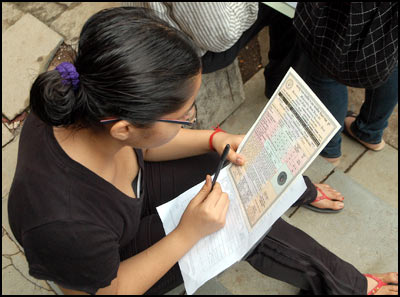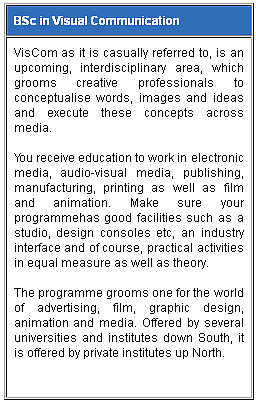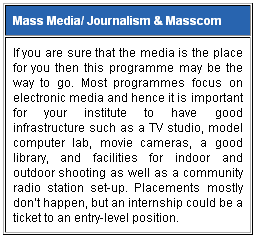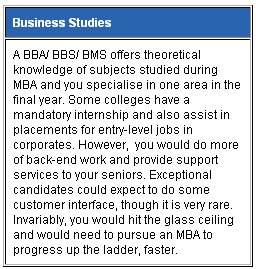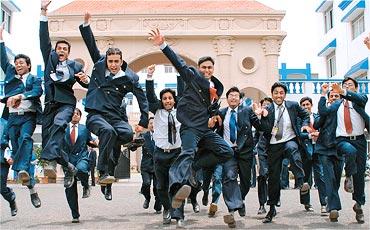 | « Back to article | Print this article |
Post Class XII: BBA, BMM, or BCA?
One day, she walked up to me and said she was miserable, wanted to quit studies!" says Chaitali Vaishnav, an English professor, sharing the plight of a first year BCom student. Her parents were unhappy about her desire to pursue performing arts, despite a talent for singing. Marriage was the first priority, and she was therefore coerced into the commerce stream.
So Vaishnav, Professor at MK Amin Arts Science and Commerce College, a constituent college of The MS University, Baroda, suggested to her that she pursue what she liked, which would also satisfy her parents. The young girl, diligent and disciplined, took her advice, switched to arts, and despite losing a year, finished her programme. She's happier now. What then? She took up a job as a music teacher in a school which helped her keep her passion alive and earn a living too.
So dear student: what career path will make you happy? This is not an easy question to answer. Lakhs of students who complete Class 12 won't make the cut for a professional field like medicine and engineering, or even in areas like hotel management, fine arts or physiotherapy. Vaishnav suggests a good starting place -- ask yourself what kind of work you would like to do in the real world. Typically, a student's foresight ends with the stream they will enter or college name they would like to have on their resume. Perhaps, it is time to reverse that trend of thought, and work backwards. Think of the job plan your education path accordingly.
Take note of your passion
Nimisha Jaiswal, a science alumnus from Welham Girls School, Dehradun, got a whiff of what she might want to do whilst editing her school magazine -- this experience piqued her interest in journalism. The corresponding course was a BA (Honours) in Journalism, she shares. That took her to Delhi University where she gave entrance exams in three colleges which offered the programme.
"Lady Shri Ram College's entrance was tough -- a photo essay, a sizable GK section, applied GK, an essay on a contemporary issue. No interview," she recalls. Nimisha was selected and is currently a third year student of BA (Honours) Journalism at LSR. This leads us to another question -- why did she not explore the option of a Bachelor of Mass Media? Her focus is amazing! "I am not too keen on electronic media and wanted to focus on print journalism. Hence I gave BMM a miss," she shares.
BMM is one of the many "industry-oriented" graduate degrees, introduced to help make graduates more employable. Other programmes include Business Studies, Visual Communication, Computer Application, Social Work, Biotechnology, Pharmacy, Retail Management and Tourism Studies.
A case in point is the four-year integrated Bachelor of Elementary Education, which was established in Delhi with the aim of developing elementary school teachers. The programme is offered by several Delhi colleges such a Gargi College, which even gives students placements.
The real world perspective
Since students pursue these studies to hike their prospects in the real world, it is only logical that we look at how employers view graduates with specialised degrees. Do they have an edge over someone with a general BA, BSc or BCom?
"For an entry-level position, we tend to favour a student with a job-oriented course over those with a generic degree," shares Aditya Narayan Mishra, CMO and VP - Staffing, Ma Foi Randstad. A business studies programme such as a BBM, BBA, BBE or BMS is a straight fit for a role in administrative, secretarial, coordination-oriented, sales-oriented or a recruitment-oriented job. Courses in retail are a straight fit for a retail company or an FMCG. BMM works for media and entertainment companies, event management, and market research.
According to Amitabh Das, CEO, Vati Consulting, an HR services provider for the IT and ITeS sector, IT companies are favouring BCA and even BSc (Computer Science, Maths, Physics, Chemistry) graduates over engineers due to business imperatives like cost, level of aptitude required, bottomlines and price pressures.
"They start at entry-level jobs in coding and testing post boot-camp trainings, and then graduate to higher levels based on their performance. In most of the cases, they get into technical jobs. We have also seen non-engineering graduates joining organisations as business analysts, implementation engineers and also for customer-facing jobs. Their aptitude and attitude towards learning is the differentiator," he adds.
But that not mean any industry-oriented course will give you the edge. It is not just the degree but the curriculum and method of course delivery that matters. "We have seen a significant difference in the quality of pass-outs from different colleges offering the same programme," Aditya observes. Industry interface and practical training are two top differentiators, which can be incorporated in several ways. The other is quality of students, which is dependent on how competitive the admission process is.
"It is not just the degree but also the curriculum and method of course delivery that matters. We have seen a significant amount of difference in the quality of pass-outs of different colleges offering the same programme," observes Mishra.
The industry exposure
To get an idea, listen to what Vikram Khanna and Juhi Malik have to say. Both are third-year students of the coveted Bachelor of Finance and Investment Analysis programme at Shaheed Sukhdev College of Business Studies (CBS), Delhi.
"We have two compulsory internships. Also, guest lectures from industry experts, industrial visits to factory plants and short-term live projects," shares Khanna, who was recently absorbed as a Junior Research Analyst by Mckinsey Knowledge Centre through campus placements.
Students can take extra courses in areas like actuarial science, chartered financial planner training or NSE's certificate in financial markets, which are not compulsory but designed to give exposure. Malik, who was absorbed by I3 Consulting says, "The atmosphere in college is so competitive that even though there are two compulsory summer internships, many people do a winter internship as well."
This competitiveness kicks off before students even enter class; around 15,000 students write the entrance test for admission to the Bachelor of Business Studies, BA (Honours) Business Economics and BFAI (unique to CBS) programmes. Their score makes them eligible for admission to 13 colleges in Delhi, out of which CBS gets the best students. This is followed by a GD and PI. Mathematics and English in Class 12 are a must in order to qualify for the entrance and 30 per cent weightage is given to your class XII score.
Industry exposure is brought in through other methods as well. For instance, Mangalyatan University (MU), a private institution in Aligarh offers a BEd (Innovation) that gets its "innovative" edge from a compulsory six-month internship at a school. According to Mohan Lakhamraju, Vice Chairman, MU, the institution has signed MoUs with educational societies such as DAV and DPS, to facilitate hands-on training.
"There's an explosion of schools in India, all needing qualified teachers. This is targeted at that need. We also have a tie-up with educomp, to help familiarise students with certain educational technology used in classrooms across schools," he shares.
Look before you leap
Though government colleges and private institutes offer industry-oriented programmes, the latter tend to charge a much higher fee. Some private institutes charge up to Rs 4 lakhs for a three-year programme. Mishra's advice to students and parents is to do research through the person in-charge of admissions. Probe questions related to industry collaborations. "The intention of the institute may be to invite industry people to deliver lectures or make students participate in real-time projects. But has the action happened? I know of institutes where a student has to spend a minimum number of hours or days in a week at a company doing real work," he shares.
The other element that must be investigated is placements. According to many students at CBS, placements are a major draw. For the batch of 2007-2010, the average placement figure stands at 5.6 lakhs per annum for jobs in consulting, stock markets and research, while Ernst and Young made 13 placement offers, according to the website. Yet, by virtue of CBS being a government institute the fee is low -- approximately Rs 5, 000 for the CBS and Rs 10, 000 for the BFSI programme. Now that's not a bad deal for a mere graduate, right?
However, not all industry-oriented courses offer such a value proposition. "The way educational institutes are busy advertising attractive marketing materials to attract students, it can get misleading," adds Mishra. Hence, talking to alumni and current students about job profiles and companies that come to campus is a must. Abhiram Kotha, a 2009 BBA graduate from a private institute in Kolkata, rejected the insurance sales job that came his way through campus placements. Instead, he worked as a research analyst for a position he scouted for on his own.
His course cost him around Rs 1.4 lakhs (according to the institute's website). This figure has been hiked to Rs 2.7 lakhs for the courses. "The BBA programme lacks depth, but it familiarises you with business jargon, hierarchies in organisations, etc. It is a passport to an entry-level job involving one process. But for scalability you need to do an MBA," he says.
Both government and private universities and institutes offer a range of industry-oriented programmes, but the seats are fewer in number as opposed to BA, BCom and BSc seats. Hence, most students will end up taking the latter.
Make the right choice
Choose subjects you enjoy, are passionate about, and some that are new and unexplored, suggests Nimisha. Further more, combination of diverse subjects can help you widen your horizons. For instance, besides media-related subjects, Nimisha's programme has traditional subjects like psychology, economics and political science. "An area like International Relations paved the way for freer, energetic, interactive discussions," she shares. On completion of the programme, Nimisha aspires to pursue a Master's in International Relations, and used her domain understanding to be a better journalist in this area.
Know your options
Before choosing a course, exposure to various options in terms of range and subject is important. A good starting place is your own high school. Kartikeye, Divya and Chavi, three first year students from CBS, got information from the career counselling divisions of theirs and in fact, heard about the concept of "industry-oriented" programmes through coaching institutes that conducted seminars in their high school. Next, understand the range of subjects that are taught across various streams.
Choosing the college and course
The common dilemma faced by students is whether they should go for a college with a brand name or a course they enjoy. It is a subjective decision. But according to Mishra, a recruiter looks at two other factors -- academic performance and projects and internships done during college. "An average performance from a reputed college, versus an unknown college, would benefit the former.
But, ultimately one's performance during the interview and written test will make all the difference," he shares. Scrutinise curriculum delivery and faculty. If you are doing a BA in Spanish or German, the faculty must be fluent in written and oral communication and know the nuances of the cultures of the home countries. "We have labs with language softwares. We watch films, use audio-visual aides and visit to cultural centres," shares Jaspal Munjal, Head, Amity School of Foreign Languages.
Beyond Academics
Dr. Hema Raghvan, former Principal of Gargi College, Delhi, cannot emphasise enough, the importance of looking at the extra courses offered by the college, which may not be a part of the curriculum but give exposure to career avenues.
For instance, St Joseph's College in Bangalore offers courses such as Space Science, Econometrwics, Principles of Genetic Engineering, Journalism and Media, Analytical Chemistry, and Medical Transcription.
It is also a good idea to find out more about the activities on campus. First-year students of CBS are welcomed with the adage, "At CBC, it's what you make of it," referring to the umpteen extra-curricular opportunities that they've conceptualised to offer a learning curve.
At the end of the day, both merit and luck, play a role in securing the best education for you. Yet, for many of those who don't get admission to a college of repute, take heart in a sentiment expressed by Infosys Chairman NR Narayana Murthy, "In life, more than what degree you get from what college, what's important is whether you have discipline, commitment, hard work, focus and, of course, a little bit of smartness. So, I'd suggest to students not to worry about which college they go to as long as they get the best out of whatever education they are being given."
